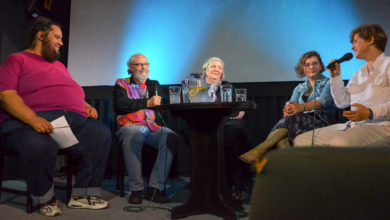„An accepting city is good for everyone” – Gergely Karácsony, Mayor of Budapest
He would feel like a hypocrite if he did not stand up for the LGBTQ community. He thinks that without Budapest Pride, Budapest would not be what it is today. The LGBTQ community, especially in Budapest, has long been waiting to have a mayor who not only takes the problems and issues of the community seriously, but also proactively stands up for them. We interviewed Gergely Karácsony, Mayor of Budapest, about a more accepting and colorful city, the possibilities of supporting LGBTQ people in Budapest, and pink tourism.
During the election, it was clear that a very significant number of people from the LGBTQ community had voted for you. Did you consider it important to address these people?
My program was about making Budapest a city that belongs to everyone. A city is a place where a high number of people live in close proximity to each other and it becomes uninhabitable when this physical proximity is coupled with social distances.
I didn’t weigh how many voters can be won and lost with this. It is not even known where this balance would tip, as there are social groups that have yet to be convinced on this issue. But the policy I believe in would be hypocritical if I didn’t stand up for the LGBTQ community. After all, Budapest would not be a city for all, only for those who belong to the majority.
Why do you consider the LGBTQ community in Budapest so important in the life of the city?
I have great respect for the people who organize the representation of their own community. In recent years, LGBTQ people have done a great deal to reshape Hungarian public thinking and create a more accepting social environment.
Our capital thrives on a variety of diverse communities and I need to consider each of them with equal importance. I am obliged to treat every one of them as a partner. In my opinion, every mayor has a duty to represent all of the communities in their city.
The LGBTQ community is a more disadvantaged community, it deserves more support, empathy, and above all a symbolic stand to carry out the mission they started. I feel it is my moral responsibility to stand up for them.

You mentioned that the LGBTQ community is not in an easy position and we have unfortunately seen a negative trend in recent times, either when we think of Act 33 (a recent legislation regarding the cessation of legal gender change of transgender people – ed.), or the slow but steady attacks against rainbow families. Are you focusing on better protecting these even smaller, even more vulnerable communities in the capital?
The situation of these communities is fundamentally determined by two factors. On the one hand, it depends on public opinion, and on the other hand, the current legislation. Unfortunately, I also see conflicting courses in this regard. I feel that the phenomenon of Pride is becoming less and less taboo or divisive for Budapest. The urban community is more open in these matters than it was ten years ago.
On the other hand, there is no doubt that not only in Hungary, but also in Poland and other European countries, there is a backward turn in legislation in this sense and there are policies that build on people’s fears to gain power from it.
The fact is, the capital does not pass laws. We may have opinions about them, but we cannot change them. However, the enforcement of these laws is very much influenced by how different institutions and actors respond to these developments.
We swore to abide by the law. As a city leader, I can promise that we will make sure that Budapest becomes a more and more accepting city over time. We can help you develop a more accepting environment. That is our goal.
The existence of the Pride is quite a controversial issue, not only for the majority of society, but even within the LGBTQ community. How important do you think it is to have a Pride parade in a capital?
That is why it is worth considering all the debates. You cannot say that it’s simply an opposition of homogeneous social groups, since there are debates within the groups as well.
It is very interesting that there has always been a debate about the Pride. The Pride always brings provocative activity to the surface everywhere, which a section of the majority of society interprets as confirmation of its own fears. We cannot expect a city to be unified in its feelings about sexuality, nor can we expect different social groups, possibly minority groups, to be homogeneous in all matters. Why would they be?
I am proud that the Pride has become an institution in Budapest, as it is not only about the parade, but also about a lot of cultural programs that are also very important. Fortunately, the Pride has a positive atmosphere nowadays. Ten years ago, I looked enviously at big cities abroad whose parade has become a festival not only for the affected groups and their sympathizers, but for everyone else as well. That is why it belongs to the life of the city, and I am glad that this event is appearing in more and more towns in the countryside, too.
I think that without the Pride, Budapest would not be what it is. And that doesn’t mean you can’t have legitimate debates about it. For my part, I agree with those who say that the Pride is a natural part of city life.

We talked about the LGBTQ people who live here, but there are also LGBTQ tourists. If we look at the tourism trends in the world, we can see that the LGBTQ community is becoming more and more important as we are talking about a target audience that is usually in a better financial position and travels more. How important do you consider it to be for Budapest to be an LGBTQ-friendly place?
I naturally consider it important, but my attitude is that tourism is sustainable in places where it is good to live. I tend to examine this topic in terms of the relationship between locals and tourists. Overtourism prevails in Budapest as well, which causes problems for tourism in the long run, while in the short run it degrades the city’s livability.
Due to the epidemic, tourism has declined, but hopefully this will not remain the case as a city needs tourists. But now we need to start thinking about what kind of tourism we want to relaunch, primarily considering the aspects that currently weigh negatively on the city.
It is true that a diverse city needs diverse tourism. This is also good for the locals, as the more diverse crowd of people come to us, the less likely it is that a homogeneous mass dominates urban spaces. We want to get as many locations around the city as possible to get involved in tourism. That is why I am especially pleased that Budapest’s tourism is becoming more colorful. We support pink tourism – and not just pink tourism. The problem is that family and cultural tourism also play a smaller role in Budapest. Currently, cheap alcohol is our main competitive advantage. But Budapest is a much more awesome and much more diverse city than that.
It’s a stereotypical question, but what is your message to our readers and the LGBTQ community? They really are not going through the easiest times …
My message is that this, too, shall pass. In recent decades, Budapest has become an accepting place and this cannot be overridden by legislation. I want to say to everyone who stands up for these issues, fights for them, or simply sympathizes with them as a voter, to always think that what they are doing is not just for their own community, but for every community. After all, an accepting city is good for every community. Not just for those who belong to the LGBTQ community, but also for those who live their lives in a completely different way. Fighting for an accepting city means fighting for not just our own community, but every other community as well.
Ádám András Kanicsár
Instagram: @kanicsar






